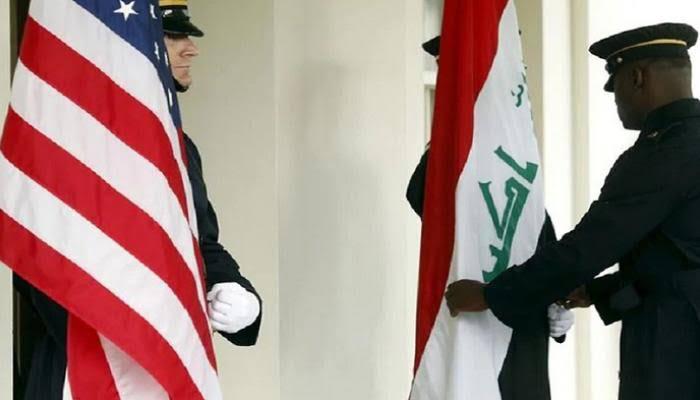Despite widespread anticipation of a US withdrawal from Iraq, the fourth round of strategic dialogue between Iraq and the United States in fact affirmed a strengthening of the strategic partnership between the two sides. According to official statements by both parties on July 23 in Washington, which hosted the last round, the talks added achieving stability to their focus on strategic partnership. This included Washington’s pledge to respect the sovereignty and laws of the State of Iraq, and to provide the resources the latter needs to maintain its territorial integrity. In exchange, the Iraqi government pledged to protect American soldiers in Iraq, whose mandate will transform over the next five months from combat to training Iraqi security forces. The statements did not disclose the number of American forces to remain in Iraq.
Repositioning of forces
The outcomes of the Iraqi American dialogue indicate a tactical shift in the nature of US-Iraqi military cooperation, with the US declaring a change in the mandate of its forces in Iraq by the end of the year, from combative missions to training and advising. In practice, however, according to Iraqi and American political assessments, limiting cooperation to these aspects will prove challenging, in the context of a deteriorating security situation in Iraq. The Iraqi government had indicated nearly six months ago the imminent end of US combat mission by the 2,500 personnel, but Iraqi forces have continued to require air support in some of their operations against ISIS hideouts.
The Wall Street Journal revealed that US forces in Iraq will be transferred to an unspecified neighboring country, on the condition of providing support in Iraq when necessary. Similarly, Baghdad’s recognition of the need for continued coordination at the intelligence level paves the way for continued military cooperation, regardless of where US forces are located.
Mixed reactions
In Iraq, reactions to these developments fell in line with expectations. Militias opposing US presence in Iraq argued that the overall outcome of the strategic dialogue revealed a tendency towards justifying continued US involvement in Iraq. This opinion was expressed by Qais Khazali, leader of the Asa’ib Ahl al-Haq militia, in response to the joint press conference between Iraqi and US Foreign Ministers, Fouad Hussein Anthony Blinken, in which the former stressed Iraq’s need for the presence of American forces. Khazali also pledged “resistance operations will continue until all American forces leave all Iraqi land.” Iraqi tribes issued a counterstatement rejecting Washington’s intention to withdraw its forces from Iraq, arguing this “will delve Iraq into chaos, great danger, and a dark tunnel, given Iraq is currently ruled by non-state and militia ideologies.” They added that the government has no authority over Iran-backed militias.
Numerous motives
It is likely that the Iraqi government had, in the period leading up to the talks, in fact intended to end US military presence. This stance was related to confrontations with Iran-affiliated militias, in addition to public threats against the Iraqi government and American forces, as well as Tehran’s pressures on the Iraqi government to end US presence. There were secret visits by commander of the Quds Force of the Revolutionary Guard Esmail Qaani to Iraq, bringing explicit messages that Tehran is in the process of restructuring its forces in Iraq against US presence.
However, the deteriorating security situation before the talks in Washington, including bombings in the Sadr City market, east of Baghdad, may have prompted Iraqi Prime Minister Mustafa Al-Kadhimi to reevaluate, and appreciate the importance of continued coordination with US forces. Given the speed at which the perpetrators of the attacks were apprehended, and the revelation of the existence of an unnamed terrorist network, it is likely that the perpetrators of the suicide attack came from within Iraq, despite the similarity to terrorist activity.
Although most domestic forces, especially those loyal to Tehran, stress the need for the permanent withdrawal of US from Iraq, as they are doing from Afghanistan, the Iraqi transitional authority, estimating that this would lead to an expansion of Iranian influence, chose to avoid this scenario.
Washington, on its part, believes that the partnership with Baghdad is “larger than the fight against ISIS”, and is coming to the realization that Tehran will not respond to its calls to change its regional policies, given its moves in Iraq and Syria. Accordingly, the United States is working to restructure the military presence rather than ending it.
Difficult repercussions
Many in Iraq and the US expect a challenging scenario of escalation by numerous actors inside Iraq in the near future. Although Al-Kadhimi has promised to protect American forces in Iraq, practical and field experience has proven this to be difficult. As the transitional phase in Iraq comes to an end, it is unlikely that the security and political situation will be conducive to holding elections. This is given that, in addition to the Sadr Market bombings, a similar explosion occurred in one of the stores of the Imam Ali division of The Popular Mobilization during Al-Kadhimi’s visit to Washington. Consequently, it is evident that renewed tension in Iraq will not be limited to attacks on US forces, but may also extend to the settling of scores on the complex domestic scene.
It can be argued that Iraqi-American calculations on the official strategic level remain unchanged, despite the change in format. The expected escalation in tensions following this round of talks illustrate how difficult it is for the two sides to make fundamental changes to the terms of their partnership, and consequently, it will be difficult to change the terms of engagement in Iraq with Iran and its proxies.

